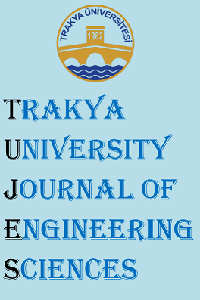EDİRNE İL MERKEZİNDE EV İÇİ RADON KONSANTRASYONU ÖLÇÜMLERİ
Meskun binalarda radyoaktif bozunmaya uğrayan radon gazı, teneffüs edildiğinde akciğer dokusunda hasara ve zaman içerisinde de akciğer kanserine sebep olabilmektedir. Edirne’de değişik semtlerde 54 evde oturma odası ve yatak odasında radon gazı radyoaktivite konsantrasyonları ölçülmüştür. Bu çalışmada, ev-içi radon konsantrasyonlarının tespitinde pasif nükleer iz dedektörleri (CR-39) kullanılmıştır. Çalışmanın sonuçlarına göre, Edirne’deki evlerde radon konsantrasyonları 2 Bq/m3 ile 125 Bq/m3 arasında değişim göstermiştir. Evlerin radon aktivite ortalaması ise 27.58 Bq/m3 olarak bulunmuştur. Bu çalışmada radon gazına maruziyet sonucunda alınan yıllık etkin eşdeğer doz 0.728 mSv olarak tespit edilmiştir. Ölçülen radon seviyesi ve yıllık efektif dozun tavsiye edilen limitler içerisinde kaldığı belirlenmiştir. Ev içinde solunan radondan dolayı yıllık etkin doz eşdeğeri ve akciğer kanseri olma riski hesaplanmış ve sonuçlar tartışılmıştır.
Anahtar Kelimeler:
Ev-içi radon, 222Rn, Edirne, CR-39
INDOOR RADON CONCENTRATION MEASUREMENTS AT EDIRNE CITY CENTER
When radon gas and its decay products is inhaled in residential buildings, it can damage the lung tissue and cause lung cancer over time. At different parts of Edirne city, for 54 houses, radioactivity concentrations of radon gas have been measured at living room and bedroom. In this present work, indoor radon concentrations were measured by using passive nuclear track detectors (CR-39). According to the results of the study, it was concluded that the concentration of radon is 2-125 Bq/m3. It was understood that the concentration of average radon obtained was 27.58 Bq/m3. In this study, as a result of exposure to radon gas from the annual effective dose equivalent was obtained to be 0.728 mSv. Measuring radon levels and annual effective doses were determined to be within recommended limits. Corresponding annual effective doses and risk probability for lung cancer due to the indoor radon inhalation were calculated and the results were discussed.
Keywords:
Indoor radon, 222Rn, Edirne, CR-39,
___
- Åkerblom, G., 1999. Radon legislation and national guidelines. Swedish Radiation Protection Inst.
- Annex, J., 2000. Exposures and effects of the Chernobyl accident. Sources and Effects of Ionizing Radiation: The United Nations Scientific Committee on the Effects of Atomic Radiation UNSCEAR, 451-566.
- Charles, M., 2001. UNSCEAR Report 2000: sources and effects of ionizing radiation. Journal of Radiological Protection 21, 83.
- Nilgün, G., 1994. Nükleer Enerji ve Çevre. Sek yayınları, Ankara.
- Organization, W.H., 2009. WHO handbook on indoor radon: a public health perspective. World Health Organization.
- Radiation, U.N.S.C.o.t.E.o.A., Annex, B., 2000. Exposures from natural radiation sources. New york, United Nation.
- Smith, H., 1988. Lung cancer risk from indoor exposure to radon daughters. Radiology 167, 580-580.
- T.C. Resmi Gazete Tarih/Sayı: 24.03.2000 / 23999. Radyasyon Güvenliği Yönetmeliği.
- Wilson, G., Martindale, C., Soranson, J., Bourhis, J., Carl, U., McNally, N., 1994. Radiation-induced cell cycle delay measured in two mouse tumors in vivo using bromodeoxyuridine. Radiation research 137, 177-185.
- ISSN: 2147-0308
- Yayın Aralığı: Yılda 2 Sayı
- Başlangıç: 2000
- Yayıncı: Trakya Üniversitesi
Sayıdaki Diğer Makaleler
EDİRNE İL MERKEZİNDE EV İÇİ RADON KONSANTRASYONU ÖLÇÜMLERİ
